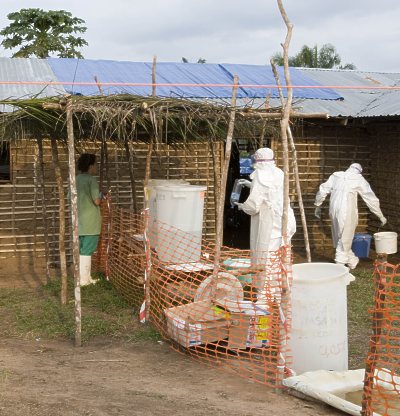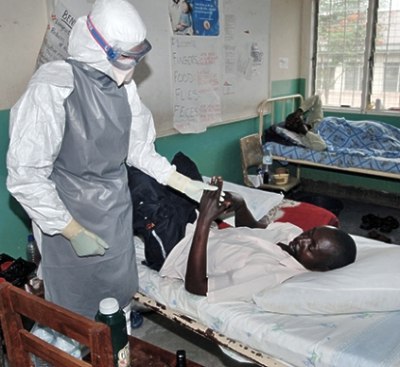 Health authorities in Guinea are facing a new and frightening challenge © WHO/afrol NewsHealth Panic in West Africa after Ebola outbreak in Guinea
Today also the World Health Organisation (WHO) issued a risk warning to neighbour countries, where several cases of suspected Ebola infections are being investigated. I areas just across the border in Liberia and Sierra Leone, six possible cases are being looked into, out of which five already have ended lethally.
MSF now also considering the situation in Nzérékoré (300,000 inhabitants) and Kissidougou (125,000), two other important cities in southern Guinea. Nzérékoré is located close to the border to Liberia and Côte d'Ivoire. Further, the organisation is examining the situation in neighbouring countries, in particular Sierra Leone and Liberia, where suspected cases already have been reported. There organisation has sent some 33 tons of supplies to Guinea on two charter planes leaving from Belgium and France, containing medicines, medical equipment and the supplies necessary for isolating patients, putting sanitation measures in place and protecting its teams, according to MSF. A very lethal virus Ebola haemorrhagic fever is among the most feared virus diseases existing, with the highest mortality rates and the quickest course of disease. The virus is known to have its natural reservoir among apes, and it is mainly transferred to people when apes are hunted for human food consumption. Wherever there is an outbreak, panic follows in its footsteps. The name Ebola stems from the Ebola River in Congo Kinshasa, where the virus was first identified in 1976, and there have since then been registered several outbreaks in exactly that area. Most reported occurrences of Ebola are from Congo Kinshasa and South Sudan. I December 2000 there was registered a major outbreak in Uganda, while there was an outbreak in Congo Brazzaville and Gabon in 2003. The symptoms of the feared and acute disease are characterised by the sudden onset of fever, intense weakness, muscle pain, headache and sore throat. This is followed by vomiting, diarrhoea, rash, impaired kidney and liver function, and in some cases, both internal and external bleeding from nose, mouth and intestines. The incubation period - the interval from infection to onset of symptoms - varies from only two to 21 days. The virus is extremely contagious and therefore also puts health workers at risk of infection. Ebola spreads through close contact with the blood, secretions, organs or other bodily fluids of infected people. Burial ceremonies where mourners have direct contact with the body of the deceased person also play a role. There is no effective treatment or vaccine against the disease. Mortality rates are between 50 and 90 percent, depending on which strain of the virus has caused the outbreak. The Zaire strain, which now is causing an epidemic in Guinea, is the most lethal. By staff writer © afrol News - Create an e-mail alert for Guinea news - Create an e-mail alert for Health news
On the Afrol News front page now
|
front page
| news
| countries
| archive
| currencies
| news alerts login
| about afrol News
| contact
| advertise
| español
©
afrol News.
Reproducing or buying afrol News' articles.
You can contact us at mail@afrol.com








